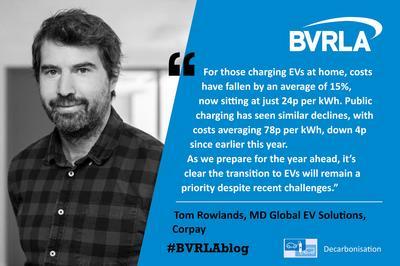The latest Allstar AllCosts report reveals that the average home charging cost has fallen to the lowest level since before the cost-of-living crisis. There is good news for drivers using the public charging network too, where costs have also fallen. Here Tom Rowlands, MD Global EV Solutions at Corpay, Allstar’s parent company explains more.

2024 has brought some financial relief for drivers and businesses managing vehicle fleets. According to the latest edition of Allstar’s AllCosts report, refuelling and recharging costs have also dropped to their lowest levels since before the cost-of-living crisis began in 2021.
The AllCosts report examines the real-life price of electric, petrol and diesel, and analyses how this has affected the cost of running vehicles for businesses. Data for this report has been gathered over the spring and summer months of 2024, and is based on data extracted from millions of charges and fill-ups on the Allstar payment network.
Here’s what the data shows and how it impacts your fleet operations.
Good news for EV and ICE vehicle drivers
For those charging electric vehicles (EVs) at home, costs have fallen by an average of 15%, now sitting at just 24p per kWh. Public charging has seen similar declines, with costs averaging 78p per kWh, down 4p since earlier this year.
It’s not just EV drivers benefitting; petrol and diesel prices are also at their lowest levels in years. In September, petrol prices averaged 136p per litre, compared to peaks of 149p in April. For businesses with large fleets, these cost reductions could likely translate into significant savings.
Looking ahead to 2025
As we prepare for the year ahead, it’s clear that the transition to EVs will remain a priority despite recent challenges. The industry continues to invest heavily in infrastructure, with more than 59,000 charge points now on the Allstar network and ChargeUK’s data showing a new connector being added approximately every 25 minutes.
For fleets still operating petrol or diesel vehicles, improving efficiency is key to reducing emissions and costs. Strategies like route optimisation, better fuel purchasing practices, and operational streamlining will help play a critical role in achieving sustainability goals during this transitional phase.
While current trends in fuel and electricity pricing are promising, it’s crucial to remain vigilant. Economic and geopolitical uncertainties mean pricing may fluctuate, so planning ahead and seizing opportunities to save are more important than ever.




